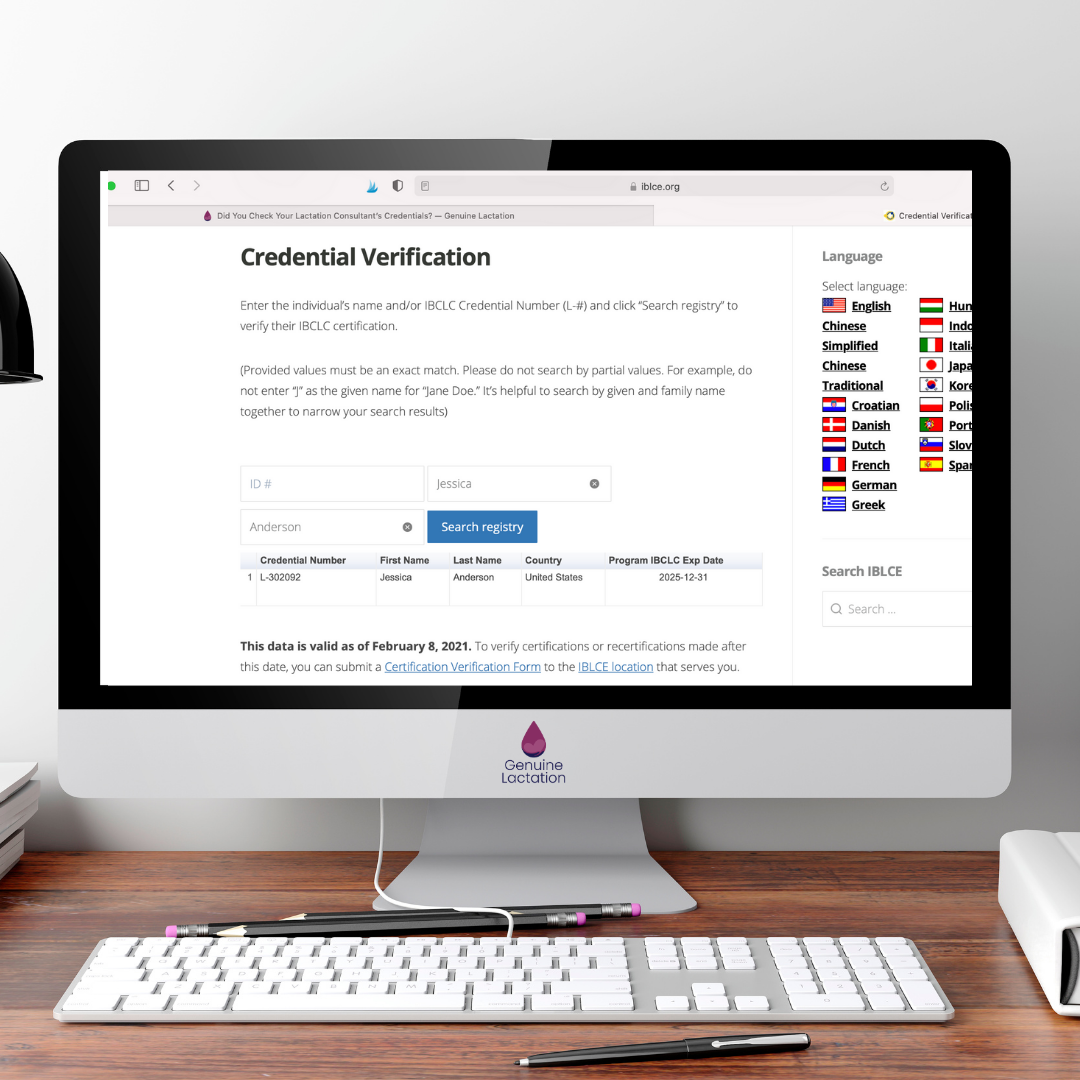Did You Check Your Lactation Consultant’s Credentials?
We assume when someone makes claims about their profession and abilities that they know what they’re doing…I mean, their Instagram account is blowing up…I have friends that follow them…they know their stuff…but do they? Has anyone you know actually been their client…and were they happy with the care received (and we can’t rely on that alone, even frauds can have great reviews)?
In a world where anyone can have a website, anyone can join a group (sorry Facebook group vetters, your vetting isn’t Fort Knox), and anyone can offer services to parents, who if wanting immediate relief, are likely desperate, will take your money while giving phony advice and doing even further damage to your breastfeeding or pumping journey.
Would you ever take your child to a dentist who wasn’t licensed…or insured? No. So why would you trust someone on the internet to fix your problems (which likely involves pictures of your breasts or nipples, yourself, and your baby) without first verifying who they say they are.
Scopes of Practice
Each type of breastfeeding certification has a scope of practice - this tells that provider what they are and are not allowed to do when working with a client. If they do something negligent or outside their scope of practice, they can lose their ability to practice (as they should). It also allows the client to seek out the best type of breastfeeding support provider for them - do they need someone who can put hands on the baby and breast? Do they need someone skilled in tongue-tie oral assessments? These scopes of practice help you as much as they do the provider.
A true provider seeing clients (whether virtually or in-person) should have insurance 1. to put their clients’ minds at ease, and 2. a true business person should want to protect themselves and their business in the event of something going woefully wrong. Lactation Liability insurance also requires the person to actually have the credentials they say they have, or their insurance company isn’t going to cover them.
Why Shouldn’t I send My Info and Pictures via Facebook Messenger?
Much like we teach our children about safe internet and texting practices, we should follow our own advice. It is not okay to just message a provider pics of your breasts and nipples like a boobie hotline - especially when you’ve never had any interaction or client-provider relationship established. You don’t know for sure who they are, and now your private pictures are just out there! There is a reason providers spend good money to be HIPAA compliant and ensure that your information can’t be accessed by someone’s spouse or children when they get on the same computer. Now, if you have established a client relationship with the provider and choose to do so even after knowing the proper channels, well, that’s your choice. But to protect myself and my practice, using the secure client portal messaging option is the BEST method.
So what can a parent do before working with a provider?
Ask them about their qualifications or to see their licensure/credential information.
Look them up in the database of credentialed providers based on the credentials they have (Do note there are wonderful programs out there without a database to search, but you can always call or email them!).
I am an IBCLC - this link allows you to look up an IBCLC licensed provider by name in their public database. It tells you when their licensure expires as well.
I am also an CLC certified by ALPP. You can verify that credential by visiting their site here.
The United States Lactation Consultant Association (USLCA) has a list of Who’s Who in Lactation which lists all the types of potentially recognized certifications that a provider may have. If you meet anyone with credentials outside of this list, question their credentials and verify the information before proceeding with care.
Do simple Google searching - in the age of the internet, it is easy to find information on providers via their website or social media. If there isn’t any social media or internet presence, use caution and seek to verify from those in your local area or support groups about their legitimacy.
Ask about their insurance - no, they won’t be mad. If they are mad, find a new provider.
Ask them direct questions about their training and experience.
Look for red flags on their social media and website:
Are there disclaimers about their lack of credentials?
Do they use a title that doesn’t link back to an official organization?
Do they have privacy practices and HIPAA notices on their website?
Do they end their credential with “in training"?
Do the titles they use match up to the organizations they claim to have trained with?
These are all examples of red flags I have personally found on the social media and websites of fake-LC providers who are out there caring for parents without having done the work to be able to provide safe care.
Your baby’s safety, the health of you and your baby, and the success of your breastfeeding journey hinge on your getting access to skilled lactation care. Don’t risk any of that on a provider who trained in the school of “I’m making it up as I go” with practices that are ethical nightmares. You deserve better.
View Related Articles…


